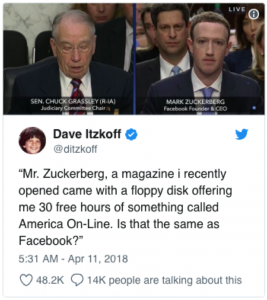
In the wake of Cambridge Analytica, there has been a helluva lot of shade thrown around, and a lot of noise made about how drastic the changes to the platform are going to be. But should you be worried?
Managing a social media strategy is all about the macro and the micro.
A great strategy is one that takes into account and incorporates all of the macro elements of the platforms that it uses, while leaving enough wriggle room so that the constantly-changing small stuff doesn’t make you sweat too much.
In other words, it factors in, for example, the fairly permanent ways that users interact with a platform and their fundamental needs, while not being so inflexible that you need to go back to the drawing board every time Instagram re-develops its algorithm to effect some minor change.
There have been some pretty far-fetched predictions about how the Cambridge Analytica scandal is going to affect the social media space – ranging from major macro-level overhauls of the Facebook platform to a more “business as usual” perspective. But apart from the recognition that most U.S Senators don’t have a clue what the Internet is or how it works, what exactly do we really know about the fallout from Cambridge Analytica?
Well, given that Facebook changed the quantity of information available to data-gathering back in 2015, it is unlikely that we will see a massive overhaul of the entire system. Likewise, most advertising and marketing agencies operate within a pretty strict set of ethical guidelines and it is unlikely that we are going to see sweeping industry-wide revolutions.
The macro environments that will change, however, are those outside of your agency’s walls: the political and public spheres.
1. PUBLIC
Despite the hashtag #DeleteFacebook enjoying a surge in popularity, with a few celebrities jumping on the bandwagon, it seems that we aren’t quite ready to forego the convenience that this social staple affords. Generally, it seems that most people are content to sit back and wait for whatever else is coming down the pipeline.
It is much more likely that the changes will be far more nuanced, affecting subtle behaviours that your audience engage in. Where before there used to be little to no thought behind whether to like a page, or engage with a post, users are likely going to be much more wary about the ramifications of their digital fingerprint. However whether this manifests in a concrete drop in engagement, we will have to wait and see…
2. POLITICAL
Without running too far down the free-speech rabbit hole, is this the way forward for the tech monopolies? There is the argument that without regulation and government inquiry there is little incentive for organisations like Facebook and Google to monitor the ways that their tech can be used – even if the Senatorial grilling turns out to be so lukewarm it could hardly melt a cheese toastie.
But do we really want these tech-toddlers to be in charge of dictating and limiting what we can and can’t do or say?
It seems that with the May 25th General Data Protection Regulation (GDPR) compliance deadline for Facebook in Europe just around the bend, most companies and individuals seem pretty content to sit back and see what happens. Whether these laws represent a substantial shift in the ways that governments regulate and punish tech companies is dubious. From the way that Facebook is encouraging users to rush through its compliance reviews by directing users quickly toward the big blue “Agree” button, its cheatable parental consent controls, and the lack of nuanced control, it doesn’t look like the platform is taking their deadline too seriously.
So, what have we really learnt?
-
-
- Making an example: the international attention that the Cambridge Analytica scandal has drawn has raised the stakes for the next company to make a data-whoopsie. The fallout from the misuse or underprotection of user’s data will now resonate much more strongly not only within political and legal terms, but also in the minds of your consumers.
-
-
-
- It is no secret that it is getting harder to get your audience to engage in the behaviours that you want them to. Amid the e-noise that bombards them daily, it is becoming increasingly difficult to capitalise on those cold leads. In the current atmosphere of digital distrust, it is even more important that brands focus on building those touchpoints and nurturing those lasting relationships. Trust is a precious commodity.
-
-
-
- Self-regulation: If Cambridge Analytica has taught us anything, it is that it is a business’ own responsibility to think through the long-term repercussions of it’s actions. Too often the all-important KPI comes to dictate our movements, leading to short-sighted, or even retroactive, thinking. The actions of CA were not illegal at the time, but they will be forever marred by this scandal. Likewise, even though Facebook worked on a fix for the issue years ago, their reputation has taken a beating for not having foreseen the malicious uses of their platform and taken stronger actions earlier. In the days of machine learning and big data, benign ignorance just doesn’t cut it these days.
-





